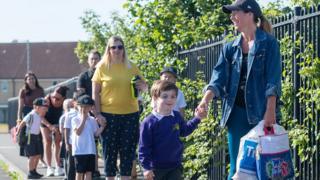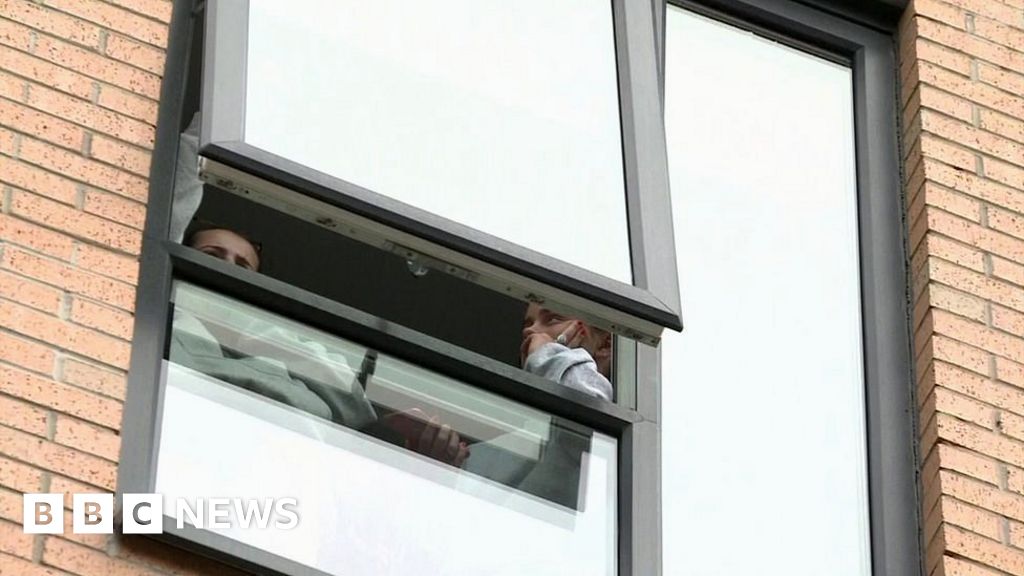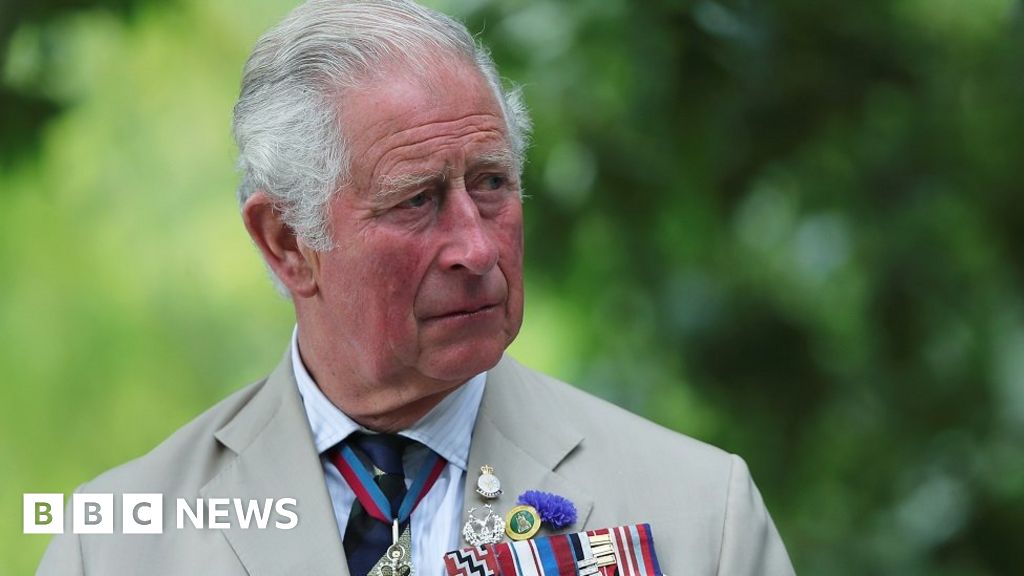 Image copyright
PA Media
Image caption
All pupils and year groups are expected to be back full time next term
Image copyright
PA Media
Image caption
All pupils and year groups are expected to be back full time next term
The government has published its safety plans for the return to school in September - built on the principle of keeping classes or whole year groups apart in separate "bubbles".
But it means if there are two confirmed coronavirus cases in 14 days, all the pupils in that group, or even the whole school, could have to be sent home.
Schools will have testing kits to give to parents if children show symptoms.
Attendance will be compulsory, with the threat of penalty fines for parents.
The safety plans issued by the Department for Education say that "given the improved position, the balance of risk is now overwhelmingly in favour of children returning to school".
The guidance sets out how schools will operate with all pupils back full time - with an expansion of the "protective bubble" system already used in schools.
The new rules for autumn will mean:
grouping children together in groups or "bubbles" in primary this will be a class, in secondary a year group avoiding contact between these groups during the school day separate starting, finishing, lunch and break times regular cleaning hands those with symptoms told to stay out of school no big group events like school assemblies arranging classrooms with forward facing desks separate groups on school buses discouraging the use of public transportThe idea is to minimise the points of contact that could allow infections to spread - and does not primarily rely on enforcing social distancing.
Education Secretary Gavin Williamson said this week: "It's "not about one metre, it's not about two metres."
Earlier this week, Mr Williamson told the BBC that parents in England who do not send their children back to school in September will face fines "unless there's a good reason for absence".
What are schools saying about the plans?
Head teachers have voiced concerns about penalty fines being issued to parents if they do not send their children back to school.
Michael Ferry from St Wilfrid's Secondary School in Crawley, West Sussex, called the threat of fines was "ludicrous" and said that he will not issue them "in any shape or form".
"A significant amount of our community has been affected by the closure of Gatwick airport and if I fine parents £120, I'm effectively saying I'm taking away eight school meals vouchers - because that's what it amounts to," he told BBC Breakfast.
He also warned that the school "cannot be full" on any given day, if pupils and teachers face any level of social distancing.
However, Ashley Harrold, head of secondary school Blatchington Mill School in Brighton, said schools could "overcome" challenges around capacity - although there were still "legitimate questions around safety".
His school had drafted four plans designed to bring all pupils back without shrinking the curriculum.
"If we just get some clear parameters of what is safe on site, we will find ways to make this work but at the moment we're playing a really complicated board game without sight of the rules," he told BBC Radio 4's Today programme.
How have parents reacted?
"I am a parent, and will not be sending my child back to school, if it is not safe to do so," Anthony told the BBC, when draft plans were revealed this week.
But Kirsty said: "Everything has got to start to go back to some sort of normal sooner or later. It's worrying but I think children need the stability of school and the social aspect of seeing their friends."
Image copyright Getty Images Image caption Parents have raised questions about how pupils will stay apart on transportThe issue of transport to school was raised by a number of families - with questions about how that would work with "bubbles".
"Living in a rural area, my sons get a three-carriage train to school with 70 other boys and girls across all secondary year groups (and Joe Public)," wrote Iain.
"Moving start times by 15 minutes here and there will make no difference to the train they catch in the morning - so how do you 'bubble' that?"
"Transport to and from school a real concern too, packed like sardines on school buses, with no additional funds for more buses. Where will the funds for cleaning come from?" said Geraldine.
Another highlighted that families could have worries about relatives. "Some grandparents live with their children and grandchildren. Some of us parents are at higher risk than others," said Ade.
There are also questions about how the bubble system will operate when families might have children in different year groups.
"The government have made everything blurred and while there is no vaccine the risks are still huge. I'll keep mine off until I'm sure of safety. Fine me or whatever - I'm looking after my family," said Eddie.
But Ian said: "Just send them back as normal and let them get on with it for goodness sake."
Sticking with all GCSEs and A-levels
The plans for returning will also recognise that pupils need to catch up after many months out of school.
This is likely to mean a "modified" timetable for the first term, with an emphasis on the core subjects of maths and English, and a regular curriculum might not return until later in the year.
Image copyright Getty Images Image caption Most pupils will be expected to carry on with a full range of GCSE and A-level subjectsBut for pupils taking A-levels and GCSEs, the expectation is that the full range of subjects will continue to be taken.
A later leak published by Schools Week suggested a subject would only be dropped in "exceptional circumstances".
In terms of safety measures, masks are not expected to be worn either by pupils or teachers.
But there will be regular routines of hand washing and desks will be arranged to children face forward, rather than facing each other on circular tables.
And the education secretary has promised a comprehensive track and trace system will be in place.
Attendance will be compulsory - with confirmation on Monday that penalty fines can once again be issued to parents who do not send their children back to school.
Although head teachers, who would refer absences to local authorities, have said they would rather build up trust in the school safety than begin by issuing fines.

 5 years ago
960
5 years ago
960 
